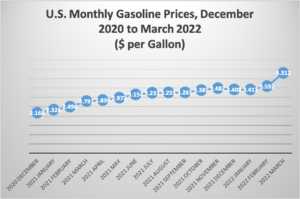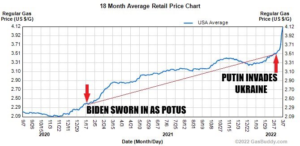A 2012 New York Times OpEd by Cornell University economist Robert H. Frank 2012 NY Times claimed a carbon tax of $300 a ton that increased gas prices by several dollars per gallon would “result in climate stability.” Frank, writing in the New York Times on August 25, 2012, claimed we could tax our way to the climate we desire.
The 2012 NYT OpEd claimed a carbon tax with higher gas prices would result in not only “climate stability” but it would also prevent an “end [to] life as we know it.”
Economist Frank explained in the NYT: “Early studies by the Intergovernmental Panel on Climate Change estimated that a carbon tax of up to $80 per metric ton of emissions — a tax that might raise gasoline prices by 70 cents a gallon— would eventually result in climate stability. But because recent estimates about global warming have become more pessimistic, stabilization may require a much higher tax. How hard would it be to live with a tax of, say, $300 a ton?”
If Frank’s claims from 2012 were correct, the Earth’s climate should be in a perfect state of “stability” now given the massive increase in gas prices since President Joe Biden became president in 2021, a more than doubling of prices at the pump. If Frank’s claims from the New York Times were correct, President Biden has officially solved “climate change” with his higher gas prices.
Chronology of Biden’s Gasoline Price Hike – Up, up, up ‘from Biden’s first day in office’ – From December 2020 through March 2022, U.S. monthly average unleaded regular gasoline prices doubled.

Update June 5, 2022: Gas prices on verge of doubling since Biden’s first day in the Oval Office – The national average price for a gallon of gas is projected by Sunday to top $4.80, twice as much as the day President Biden took office. The average price per gallon was $2.40 on Jan. 20, 2021, based on an average of the leading fuel-monitoring services. The average price on Friday was $4.78 and market analysts expected it to tick up at least 2 cents over the weekend.
The magic of carbon taxes! Economist Herman E. Daly in 2007, also claimed carbon taxes will bring “climate stability.” “And the most important public good served by the carbon tax would be climate stability, brought about by the consequent reduction in use of carbon fuels and the incentive to invent less carbon-intensive energy sources.” (Source) – Herman E. Daly, professor in the School of Public Policy at the University of Maryland, author of Ecological Economics, Steady-State Economics, Valuing The Earth: Climate Change: From ‘Know How’ to ‘Do Now’, Grist, Aug. 14, 2007.
Related Links:
Flashback 2012 Analysis of NYT OPED: Why a Carbon Tax Is Still a Bad Idea – By Kenneth P. Green
Early studies by the Intergovernmental Panel on Climate Change estimated that a carbon tax of up to $80 per metric ton of emissions — a tax that might raise gasoline prices by 70 cents a gallon — would eventually result in climate stability. But because recent estimates about global warming have become more pessimistic, stabilization may require a much higher tax. How hard would it be to live with a tax of, say, $300 a ton?
If such a tax were phased in, the prices of goods would rise gradually in proportion to the amount of carbon dioxide their production or use entailed. The price of gasoline, for example, would slowly rise by somewhat less than $3 a gallon. Motorists in many countries already pay that much more than Americans do, and they seem to have adapted by driving substantially more efficient vehicles.
…
A carbon tax would also serve two other goals. First, it would help balance future budgets. Tens of millions of Americans are set to retire in the next decades, and, as a result, many budget experts agree that federal budgets simply can’t be balanced with spending cuts alone. We’ll also need substantial additional revenue, most of which could be generated by a carbon tax.
Prof. Frank’s columns in the NY Times Sunday business section:
Reducing CO2 emissions would actually be surprisingly easy. The most effective remedy would be a carbon tax, which would raise the after-tax price of goods in rough proportion to the size of their carbon footprint. Gasoline would become more expensive, piano lessons would not. … [W]e could insulate ourselves from catastrophic [climate] risk at relatively modest cost by enacting a steep carbon tax. Early studies by the Intergovernmental Panel on Climate Change estimated that a carbon tax of up to $80 per metric ton of emissions — a tax that might raise gasoline prices by 70 cents a gallon— would eventually result in climate stability. But because recent estimates about global warming have become more pessimistic, stabilization may require a much higher tax. How hard would it be to live with a tax of, say, $300 a ton? … Carbon Tax Silence, Overtaken by Events, Aug. 25, 2012)
Former Obama U.S. Treasury official Mark Mazur says quiet part out loud: ‘We don’t want lower prices for fossil-fuel buyers, we prefer higher prices’ to achieve ‘climate change goals’ – Former Obama U.S. Treasury official Mark Mazur rejects the call for a gas-tax holiday because it “undercuts the administration’s climate change goals — where really to care about fossil-fuel consumption, we don’t want lower prices for fossil-fuel buyers, we prefer higher prices.”
Norwegian finance CEO Kjerstin Braathen: Energy transition will create energy shortages & inflation, but ‘that pain is actually worth it’ – Norwegian finance CEO Kjerstin Braathen: “We need to accept there will be some pain in the process. The pace that we need will open up for missteps. It will open up for shortages of energy, it will create inflationary pressures. And maybe we need to start talking about that, that pain is actually worth it because if we don’t there is no business case, there is no economy, there is no welfare.”
Biden praises high gas prices as part of ‘incredible transition’ away from fossil fuels
Video of Obama seeking to bankrupt coal industry in 2008: – Flashback 2008: President Barack Obama in interview with the San Francisco Chronicle editorial board: “If somebody wants to build a coal-fired power plant, they can. It’s just that it will bankrupt them,” Obama said, responding to a question about his cap-and-trade plan. He later added, “Under my plan … electricity rates would necessarily skyrocket.”
Triple price of gas to save planet, UN climate expert Thomas Stocker argues – Meet the man who wants to impose his warmist religious beliefs on you! – Canadians may abhor the rising price of gasoline, but Thomas Stocker suggests the planet might be better off if it soared to “three to four” times its current level. “This is scandalous, I know,” said Stocker, adding sky-high gasoline could help slow the climate change which world leaders have declared one of the greatest challenges of our time.




